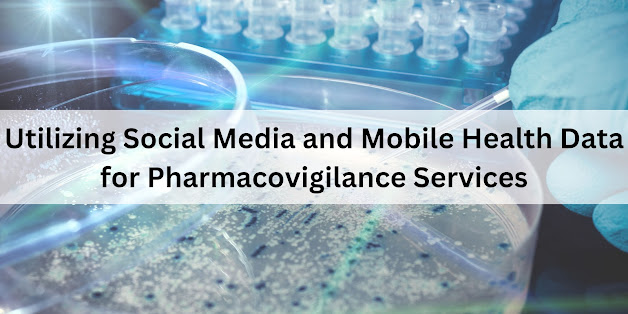Utilizing Social Media and Mobile Health Data for Pharmacovigilance Service
New and
innovative technologies, such as social media and mHealth (mobile health)
technologies, have brought significant advancements to the field of
pharmacovigilance. These technologies can be incorporated into
pharmacovigilance services to enhance signal management and streamline
Individual Case Safety Reports (ICSRs) processing and submission. However,
certain challenges and considerations must be addressed to effectively harness
the value of these technologies in supporting medicines regulation.
Social media platforms offer unique advantages in pharmacovigilance and public health monitoring. They provide a vast volume of internet-based, patient-generated, unsolicited, continuously updated data. This abundance of data allows researchers to access a wide range of information for pharmacovigilance purposes. By analyzing social media content, including user's personal experiences with medications, potential adverse events related to specific drugs can be identified and monitored in real-time.
Advanced
technologies such as machine learning, natural language processing (NLP), and
data processing capabilities can be employed to make the most of social media
data. These technologies enable efficient analysis and extraction of valuable
insights from the vast amounts of data available on social media platforms.
However, there are challenges associated with using social media data in pharmacovigilance. Ensuring the credibility and quality of user-generated content is crucial, as the reliability of the findings depends on the trustworthiness of the data. NLP techniques may face difficulties in accurately processing and extracting relevant information due to misspellings, non-medical language, and descriptive terms used by users. Moreover, the imbalance between drug-associated data and ADR-related data collected from social media requires careful data curation and sampling techniques.
Additionally,
determining true personal experiences with prescription drugs can be
challenging, as social media content may include unrelated information or
intentional misinformation. Validating the authenticity of experiences
necessitates additional mechanisms for verification and validation.
Technical, policy, and privacy concerns also arise when incorporating social media data into pharmacovigilance activities. Data governance frameworks must be implemented to ensure the proper handling and protection of user privacy. Compliance with data protection regulations and adherence to ethical guidelines are essential to safeguard the rights and well-being of individuals.
In the case of mHealth technologies, these innovative tools provide access to large volumes of data that traditional methods may not capture. Incorporating mHealth in pharmacovigilance allows for more robust patient-centred evidence and post-licensing surveillance. However, data validity remains a concern, particularly during the pre-licensure phase, while maintaining consistency in data collected after product authorization is crucial.
Given the rapid evolution of these technologies, a collaborative approach among regulators is vital. Establishing a clear roadmap for the use of social media and mHealth technologies can address the challenges raised and guide regulators in effectively utilizing these technologies in medicine regulation. This approach involves developing robust data governance frameworks, refining algorithms for data processing, collaborating with social media platforms to enhance data quality and credibility, and conducting regular compliance audits to ensure adherence to best practices and identify areas for improvement.
In
conclusion, the incorporation of social media and mHealth technologies into pharmacovigilance
services holds great potential for improving public health outcomes. By
addressing the challenges and limitations associated with these technologies,
regulators can leverage the unparalleled data size, direct source of personal
experiences, and advanced data processing capabilities to enhance signal management, ICSR processing, and submission, ultimately strengthening
medicines regulation and patient safety.

Comments
Post a Comment